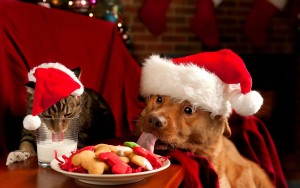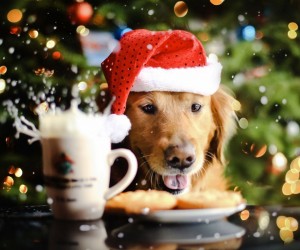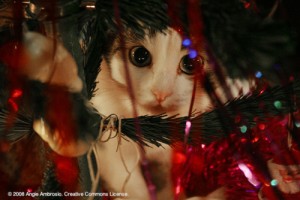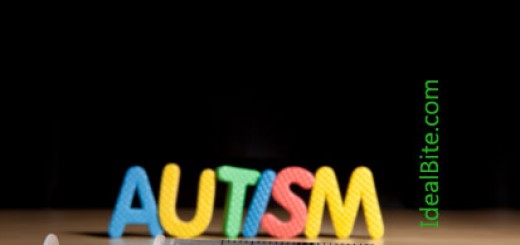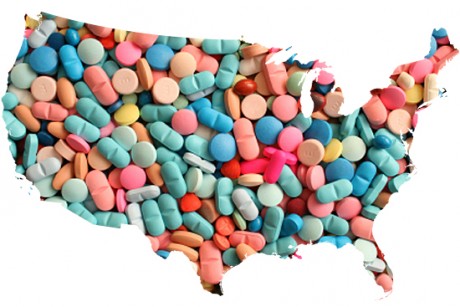Happy (and Safe) Holidays for Your Pets
Proverbs 12:10
“A righteous man regardeth the life of his beast: but the tender mercies of the wicked are cruel.”
Commentary
We all give our dogs table scraps at times. When they sit watching us eat and they focus those pleading eyes on us, our hearts melt. We love sharing as much as they do. But a food may actually be healthy for us and yet still cause serious harm to our dog. Therefore, we need to know the items on this list very well to make sure we never share them. Remember that these 20 foods also can appear within other foods (such as onions in chili, for example). And just because you’ve fed any of these in the past and had no obvious problem doesn’t mean you should continue to do so. You’re overdue for problems if that’s the case.
The featured article is very long, with information relating to how each item harms dogs, symptoms to watch for, how long it may take for symptoms to appear and how quickly to seek vet care. Unfortunately, each item is on a separate page so it takes some time to go through the entire article thoroughly. Because of the length of the article and the depth of information on each item within it, the only topic this post will cover is protecting your bff through the holiday season.
Listed below are the 20 items, but to learn specifics on each, please check the article. That time spent will be well worth it if it allows you to avoid serious problems with your best friend. Be sure to keep an eye on holiday guests as well. Although you may know that something is dangerous for your pet, everyone else may not. Guests can be well meaning when they share, but that doesn’t change the harm that can occur. And unfortunately, certain guests can find it ‘funny’ to see how an animal reacts when given alcohol or other items so that they appear drunk. But they won’t be laughing when your pet becomes seriously ill or dies as a result of their prank.
Pet Health
20 Human Foods That Can Cause Serious Illness or Death To Your Dog
“Even though a lot of the food that we eat is good for our canine friends, some human food is downright dangerous for them. So dangerous, in fact, that the FDA (Food and Drug Administration) had to issue an official statement…
To keep your dog healthy, avoid giving him the following snacks.
1. Chocolate
The chemical that gives chocolate, especially dark chocolate, its distinctive taste can be fatal to dogs when consum[ed] in larger amounts. And when we say fatal, we mean fatal, because there have been numerous dog fatalities due to consuming chocolate.Keep it away from them and do not give chocolate to your furry friend, no matter what.
Chocolate may not be toxic to your dog if given in very small amounts, however, it is a very common cause of dog poisoning because people who do give their dogs chocolate, usually give them way too much.
Cocoa beans contain caffeine and theobromine, a chemical compound. The dog isn’t able to metabolize theobromine as fast as humans can, and the more theobromine the chocolate contains, the more poisonous it is for your dog.
2. Grapes
Some dogs are especially sensitive to grapes (and raisins) and can suffer kidney damage from eating the sweet food. The reason some dogs develop renal failure following the ingestion of grapes and raisins is not known, but there have been many reported incidents of this occurring. Their toxicity to dogs can cause the animal to develop acute renal failure (the sudden development of kidney failure) with anuria (a lack of urine production).These are all serious health conditions and should not be taken lightly. Be especially careful with grapes that have gone bad, because dogs will sometimes sniff them out of the trash bin and eat them if not properly disposed.
If your dog eats grapes [or raisins] and experiences …symptoms, instant treatment is necessary. The recommended treatment is to induce vomiting, but make sure to call your vet for assistance.
3. Garlic and Onions
Although it’s rare for a dog to eat enough garlic or onions to hurt themselves, you should be aware of the possible dangers from allowing them to consume it. Damage to their red blood cell production is a common problem that comes with dogs eating onions or garlic.If your dog eats garlic or onions, take him to your veterinarian immediately (the onions don’t have to be raw to be bad for your dog’s health).
Some of the symptoms of problems that stem from onions and garlic include weakness, lethargy, vomiting, diarrhea, pale gums and breathlessness.
Also, remember that even the smallest amount of garlic can result in life-threatening problems and in severe cases, garlic or onion poisoning can lead to organ failure and even death.
4. Macadamia nuts
[S]ome dogs will experience health problems after eating them, while others will not, so it really depends on the dog and how he copes with it. The exact amount that causes health problems can significantly vary from dog to dog as well, usually depending on size.If your dog develops any symptom of food poisoning, take him to your veterinarian immediately. These signs include vomiting, tremors, hyperthermia and the inability to walk.
5. Avocado
6. Alcohol
Ethanol is found in alcoholic beverages and is toxic to dogs. Dogs can’t process the substance nearly as well as humans and it can be fatal for them.With the holidays coming up, keep in mind that dogs are especially tempted by eggnog.
Although some people think that there’s nothing funnier than a dog that has had something to drink, this unusual and cruel practice is actually hurting the dogs very seriously, especially if it becomes a habit. So pay close attention to your younger friends and relatives who might try to do something similar, and prevent them from hurting these poor, defenseless animals.
However, you also need to know that poisoning can occur even if your dog doesn’t drink actual alcohol. For example, cakes soaked in rum and similar foods and treats [that] contain yeast can result in alcohol poisoning. If you suspect that your dog is intoxicated, you might need to induce vomiting or even take him to the vet to pump his stomach. Alcohol poisoning is frequent in dogs…”
7. Bread dough
Even the smallest amount of some foods can actually be very poisonous for your beloved friend. Your home and kitchen need to be dog-friendly.We have already talked about alcohol poisoning, but what you need to know is that ingesting bread dough can lead to this problem as well. The combination of rising dough in your fluffy friend’s stomach and alcohol poisoning can seriously threaten your dog’s health.
It takes approximately one or two hours for the symptoms to appear.
8. Bad or moldy food
Food that has gone bad should not be in your house at all and should be properly disposed of, so that even stray dogs cannot get poisoned. The toxin found in some molds that leads to food poisoning is called tremorgenic mycotoxin.Since you can’t know for sure whether a particular mold contains this toxin, don’t give your pet moldy food ever. To put it simply, if you wouldn’t eat it, neither should your dog. If your see your dog eating food it shouldn’t eat, try to take it away.
9. Anything with caffeine in it
10. Bones and leftovers
You may think that it’s only natural to give bones with some meat on them to your dog but this may cause some serious health problems.One is pancreatitis, which can lead to problems with regulating blood sugar levels and digestion. All these problems are very serious and should not be taken lightly. So be very careful when it comes to leftovers.
As far as bones are concerned, they may splinter or break and get lodged inside the intestines or even the throat. [They also can easily puncture the stomach which will cause an agonizing death.]
11. Ice cream
It can cause relatively serious intestinal problems that can lead to internal bleeding, and when this happens, the chances of survival are not good.Although it’s not lethal in small amounts, it’s still something that you just shouldn’t feed to your pet. Usually after eating ice cream, dogs will get diarrhea and start scratching themselves like crazy.
You should take them to the vet immediately and not wait it out. A general rule is that you should treat your dog as you would treat your own child and that means taking him to the doctor/vet immediately.The problem with ice cream is that dogs don’t digest milk and milk products easily. Basically, your dog will enjoy himself/herself for a couple of minutes and then will start experiencing stomach pain.
12. Raw meat and fish (salmon)
Raw meat can cause various bacterial infections, and this is even truer for fish. Salmon is especially dangerous since it can cause salmon poisoning disease that can kill your best friend in two weeks.Salmon poisoning disease is caused by an infection with a type of rickettsia, Neorickettsia helminthoeca bacteria. Symptoms of SPD begin about one week after eating the salmon and include vomiting, diarrhea, loss of appetite, depression, high fever, and enlarged lymph nodes.
Now, here’s one fact that might frighten you, but you should be frightened when it comes to salmon poisoning disease, because it’s no joke: Untreated, mortality reaches 90 percent.
13. Plums
Any fruits that have large seeds or pits should be kept away from your dog for obvious reasons. Inflammations and intestinal obstructions are caused by them. In addition, dogs, especially older ones, can break their teeth on these pits while they are trying to chew through them.When eating this type of fruit, you should put the pits or seeds in one separate bag that will be tightly tied and immediately disposed of it. Stray dogs are might go through the garbage and they shouldn’t eat things that might harm them either.
Another fact that you may not have known is that plum seeds contain cyanide, and we are certain you know what cyanide is, so be careful with plum seeds.
14. Raw Eggs
First of all, there is a chance of a Salmonella infection, the same as in humans, but more importantly, if a dog was fed raw eggs for a longer period, he may experience problems with Vitamin B regulation.Another worry with the consumption of eggs is the biotin deficiency. The signs of intestinal obstruction include vomiting, diarrhea, lethargy, stomach pain, fever, dehydration and weight loss.
And although eggs are a good source of nutrition, don’t overdo it – an occasional treat could be perfectly fine, but avoid them on a daily basis. Another option is to simply cook the eggs if you’re worried that they could harm your doggy.
15. Salt
If your dog ate excessive amounts of salt, he could get sodium ion poisoning, which is rather difficult and painful to treat.Treatment for salt poisoning includes the careful administration of IV fluids, electrolyte monitoring, treatment for dehydration and brain swelling.
16. Candy
Of course, it’s okay to give your dog a treat, but you have to be careful with the kind of the treat.
Candy usually contains Xylitol, an artificial sweetener that causes sudden release of insulin in their bodies. [Be careful of sugar-free gum as well. It can be deadly because xylitol is what makes it sweet.]You have probably heard that chocolate is bad for dogs, well Xylitol is estimated to be 100 times as toxic as chocolate to dogs. For example, Xylitol can cause liver damage and low blood sugar.
It is also advised to avoid giving your dog any foods that contain artificial sweeteners, preservatives or additives.17. Hops
Used as a flavoring and stability agent in beer, they are commonly found almost anywhere…. They are the cause of hops poisoning, which causes uncontrollably high temperatures and restless behavior followed by excessive panting.If you notice these symptoms, take your dog to the vet immediately. They can also cause malignant hyperthermia in dogs, usually with fatal results.
Chemical succinylcholine overwhelms the body’s capacity to supply oxygen, remove carbon dioxide, and regulate body temperature, eventually leading to circulatory collapse and death if not treated quickly.
Additionally, without treatment, death can occur within 6 hours of ingestion.
18. Chicken jerky products [See our post: Pet Health: Contaminated Pet Food – Deadly Ingredients!]
19. Dairy
You might think a slice or two of cheese isn’t a big deal, but it all depends on the type of reaction your dog has to the lactose in the dairy product. Many dogs are severely allergic to it, and can also be lactose intolerant.While some dogs can have a bit of ice cream or a slice or two of any cheese with no reaction at all, for some dogs, it could lead to vomiting, severe stomach upset, diarrhea, excessive gas, and weight loss. So the dog may also try to drink an excessive amount of water to compensate for the water lost during vomiting or diarrhea periods.
20. Yeast
Live yeast can be dangerous to all animals, especially when consumed in large quantities. According to the Veterinary Medicine portal, there are two major health risks associated with dogs ingesting yeast.The first is that a warm and wet stomach provides the ideal surrounding for the yeast to expand, which, in turn, could cause the organ to react by expanding too, possibly cutting off blood flow and causing breathing problems. It can cause a bowel obstruction. Secondly, it can actually cause alcohol poisoning, believe it or not.
Foods Dogs, Cats Should Not Eat, Dangerous, Toxic, Lethal and Foods That are Beneficial This article has a fairly complete list of foods (and added ingredients like specific preservatives) which are dangerous for pets, and it’s all on one page. But because it also has much more, we’ll discuss it in more depth in a future post. For now, if you want info on a specific food, it’s easier for reference than the lead article, though it doesn’t cover all of the foods listed above.
Holiday Dangers for Cats and What You Can Do to Lower the Risks The holidays can be especially dangerous for cats. Many cats love to chew on house plants, and Christmas roses, amaryllis, mistletoe and holly all are poisonous to cats. Poinsettias are dangerous too, though they’re not as toxic as the others. If you have cats, don’t take the risk. Forego these plants as decorations. Similarly, potpourri has herbs and oils that are unsafe.
Another real concern comes with packages under the tree. Ribbon and strings are especially attractive to young or playful cats who are tempted to eat them. When that occurs, they can easily wrap around inside and cause intestinal obstructions that require surgery, or are fatal. Candles and electrical cords also make tempting playthings and can cause disaster. (Remember the film “Christmas Vacation”?) Finally there’s glass ornaments which easily smash and stagnant tree water to consider.
“We all enjoy special foods, particularly over the holidays. During these weeks, our homes are often filled with chocolates, wine and other culinary masterpieces. Many of these items can be quite dangerous for our pets, both feline and canine.
Besides the wonderful foods we share over the holidays, many of us also spend a lot of time decorating our homes and decking out the halls. Although these decorations add beauty to our homes and are a traditional part of the holidays, they can also pose significant risks for your cat.
The ASPCA Poison Control Center can be reached at and the Pet Poison Helpline is available at 855-764-7661 (a fee is applied). Program these numbers into your telephone so they are readily available if needed. Hopefully, there will be no need to use these telephone numbers but, if needed, you’ll be glad to have them close.“
 For Happy Cats And A Happy Holiday Season: Think Like A Cat
For Happy Cats And A Happy Holiday Season: Think Like A Cat
“Being naturally curious, cats will sniff the Christmas tree, may try to climb it or even pee on it. No cat paw can resist shiny dangling ornaments or shiny wrapped chocolates in a candy dish. They don’t understand why you’re angry for breaking Aunt Martha’s antique what not, or rolling mandarin oranges under the sofa. To a cat, everything is a potential toy and a potential
hazard.
Accidents can and do happen to cats and or the home in a blink of an eye. The following are a few real hazards that are well documented.
• Cats have an accident or get suddenly ill requiring immediate vet care.
• Water bowls get spilled, leaving nothing to drink.
• Toxic products can be pried open with paws. Windows can be opened, screens ripped open.
• Water pipes freeze and bursting, Fires in the home or nearby. Burglaries.
• Suffocation or electrocution from cords or decorations. Always unplug Christmas lights before leaving the home. The most dangerous decoration is tinsel. If swallowed, it can be lethal so just say no.
• Nothing spells holiday blues quicker than an emergency trip to the vet. The best solution is prevention.“
Finally, even though this is a commercial, it’s one of the best cat videos you’ll find, especially when it comes to how cats perceive Christmas:
Conclusion
Your physical health is very important, but of even greater importance is your spiritual health. Man suffers from a fatal spiritual disease called sin, which always leads to death.
Romans 6:23 For the wages of sin is death; but the gift of God is eternal life through Jesus Christ our Lord.

